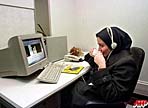Tehran's first cybercafe: where East meets Web
 TEHRAN, Dec 9 (AFP) - It may be the only cybercafe
that requires women to wear a veil, but at Tehran's aptly named "Way
of the Future", the Islamic revolution is coming head to head -- or
at least head to monitor -- with the brave new world of the Internet.
TEHRAN, Dec 9 (AFP) - It may be the only cybercafe
that requires women to wear a veil, but at Tehran's aptly named "Way
of the Future", the Islamic revolution is coming head to head -- or
at least head to monitor -- with the brave new world of the Internet.
"It's alright to serve coffee or tea here but no gin and tonic,"
jokes Kulak Amanpour, who got the idea to open Iran's first Internet cafe
from his years on the decidedly more relaxed French Riviera.
Amanpour and friends opened the Way of the Future in November, and while
recognising the importance of the youth market -- the cafe, with its bright
modern interior, is located close to Tehran University -- they also try
to avoid unwelcome visits from the authorities.
Islamic laws governing social intercourse in Iran since the 1979 revolution
are strictly enforced, and that means all women must be veiled -- and male
and female customers are segregated on different floors.
Women sit downstairs while men are restricted to the terminals upstairs,
where the greater number of computers says perhaps less about social mores
than about the kinds of customers Way of the Future expects to attract.
But on a recent visit the cafe was buzzing with visitors of both sexes,
who pay 20,000 rials (about 6.5 dollars) an hour to surf the web -- with
tea or coffee on the house. "People are interested," said Nasim,
a female staffer who helps women visitors navigate their way through the
labyrinth of the Internet.
"Many come here to send e-mails to their friends abroad,"
she said. But while customers can send personal messages just about anywhere
in the world, what they're allowed to access on the Internet is also governed
by strict Islamic code.
The cafe is linked to the Net by one of the country's several access
providers, all of which block off pornographic sites or those belonging
to the Islamic republic's political opponents.
But in yet another sign of changing times, even the nation's hardline
conservatives -- who maintain fierce opposition to the cultural products
of the "decadent" West -- are increasingly discovering they too
can disseminate their ideas amid the Internet's information free-for-all.
The Iranian government has put the complete works of the Islamic republic's
founder, Ayatollah Ruhollah Khomeini, on the web, and even the arch-conservative
seminary in the holy city of Qom is training its mullahs to surf the Net.
The Iranian media is also joining the fray, with newspapers from the
moderate Hamshahri to the radical fundamentalist Jumhuri Islami now running
their own web sites.
Meanwhile, a growing number of Bazaaris, the business class that has
traditionally made its money from commercial stand-bys such as carpets,
are switching to computer equipment shops as Iran begins to embrace --
slowly -- the modern world of the web.
"Internet allows me access to otherwise inaccessible research sites
abroad," said Nilufar, an industrial design student who heard about
Way of the Future from a friend.
Such word-of-mouth advertising is worth its weight in rials, and likely
to be more effective than the cafe's modest advertising campaign which
tries hard not to appear overly modern.
And as satisfied surfers spread the news of Iran's first cybercafe,
its owners may eventually feel secure enough to devote the entire space
to Internet terminals.
But for now -- just to get through the "rough times," as one
of the owners put it -- part of the cafe is still doing double duty: as
an office furniture outlet.
Links


![]()